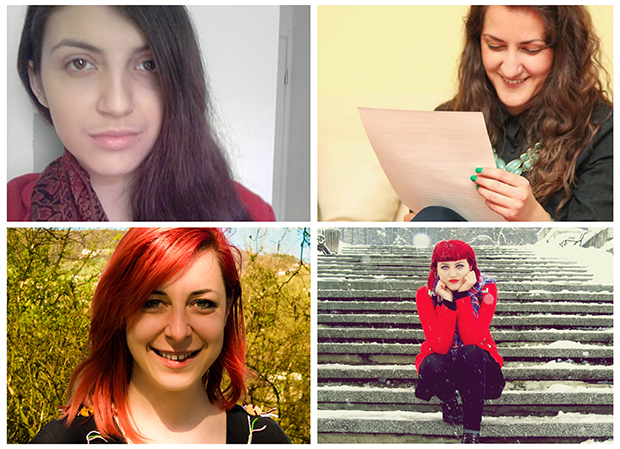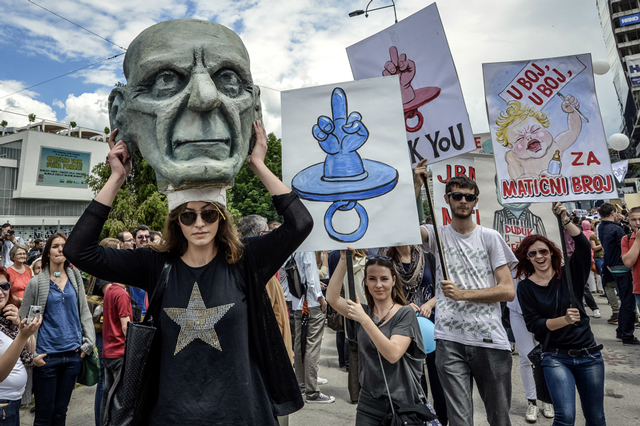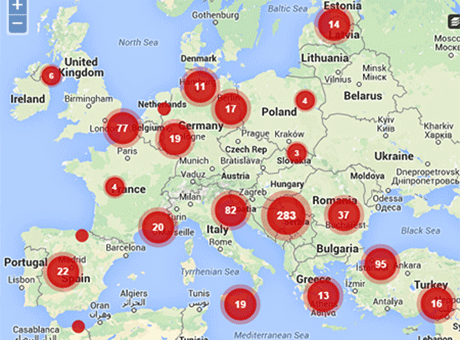27 Apr 2015 | Bosnia, mobile, News and features

Sara, Nataša, Elma and Lejla (clockwise, from top left) are local correspondents for Balkan Diskurs.
At first glance it’s easy to mistake Bosnia and Herzegovina’s media landscape as one of promise. With a constitution that guarantees freedom of the press, a large number of media outlets, and a financially independent regulatory body, the small Balkan country performs relatively well by Southeast European standards.
But on closer inspection such freedoms are a mere façade, hiding this divided, post-war state’s continued struggle with a highly polarised and politicised media. Despite appearances, many of the fundamental aspects of media freedom face significant challenges and, according to recent reports, the situation is only worsening.
Lejla, Nataša, Sara and Elma live their lives within this decline. All in their early to mid-twenties, they represent a generation that had little to do with the war but that bears the burdens of its legacy nonetheless. All four are full-time students, but in their spare time, they’re working towards a fairer, freer future across Bosnia as local correspondents for Balkan Diskurs – a non-profit platform created and run by a regional network of journalists, artists and activists, dedicated to providing objective news (full disclosure: the author of this article works with Balkan Diskurs).
“The media is in the hands of the government. Certain persons dictate which news to publish, how much, and so on,” explains Nataša, from Bijeljina, the second largest city in predominantly Bosnian Serb Republika Srpska, one of the country’s two constituent entities. Sara, from Jajce, confirms that her impression of media within her entity, the predominantly Bosniak and Bosnian Croat Federation of Bosnia and Herzegovina, is the same: “They should be working for public benefit, [but] they are mostly just an arm of parties and political elites.”
Such criticisms will come as little surprise to those who have been tracking the state of media freedom in Bosnia. Index on Censorship’s Mapping Media Freedom project, Freedom House and Reporters Without Borders have pointed to mounting levels of political pressure and media partisanship. Such pressure takes a variety of forms, but largely stems from the country’s ongoing ethnic and political cleavages. Many media outlets, including Bosnia’s three public broadcasters, are organised along ethnic lines, while some are either aligned, openly affiliated or funded by specific political parties or figures.
As a consequence, skewed media coverage is commonplace and corruption and crime often goes unreported. As Lejla explains: “Many things happening in Visoko are never reported in media, for reasons unknown to me, and those are not small things either – for example there were multiple shootings last month and very little was written about it.”
Media bias, she added, “is most obvious though when political topics from the Federation and Republika Srpska are compared”.
The International Criminal Tribunal for the former Yugoslavia (ICTY) is a regular victim of such political bias. Much of the local media coverage of the tribunal is skewed and selective. For example, during the closing days of the case against Radovan Karadžić, the Sarajevo-based Dnevni Avaz focused on the prosecution’s charges against the former Bosnian Serb politician, while Banja Luka-based Nezavisne Novine focused solely on his defense and protestations of innocence. Furthermore, only “a handful” of independent organisations in Republika Srpska are known to report on trials within Bosnia’s local War Crimes Court.
Equally as worrying is the fate of those who resist such political pressures. It is not uncommon for journalists and media outlets in both of Bosnia’s entities to face harassment from political, religious and business leaders. Last December, Republika Srpska’s anti-corruption police raided the Sarajevo headquarters of Klix.ba with the aim of identifying the source of a recording published on the news site. Nor are Bosnia’s regulatory agencies immune, as demonstrated by a spate of unidentified attacks against the country’s press council in 2014.
Political pressure is not the only threat to media in freedom in Bosnia. The country’s deteriorating economic situation also presents serious challenges. “Journalists sell their names for trinkets, I guess due to lack of other options or because they are used to taking the easy way out,” Elma explains. “I have witnessed various manipulations by local ‘wannabe journalists’ who publish every single piece of information that lands in their inbox without checking it, not being aware of the consequences,” she adds.
This thoughtless reproduction of news frequently leads to the rapid spread of false information, as demonstrated by the whirlwind of stories surrounding Bosnia’s protests last spring. This phenomenon is only exacerbated by a strong culture of social media use and low levels of media literacy. “The problem is anyone who has internet access can start their own portal or a Facebook page where they will write whatever they want in anyway they see fit… and many people lack critical thinking,” says Elma.
This sad truth has a silver lining though, and it is one all four women subscribe to through their work with Balkan Diskurs and within their local communities: Bosnia’s citizens also have the potential to change the media landscape. “Thinking with your own head and not being a sponge that soaks up everything that is offered [is important],” claims Elma.
Meanwhile her colleagues underline the promise of independent media in terms of media freedom. “Balkan Diskurs gives my voice an opportunity to be heard, so that stories that others keep quiet about can be told; to present my town in a different, more real light. That opportunity, for me, is priceless,” concludes Lejla.
Balkan Diskurs is a non-profit, multimedia platform created and run by a regional network of journalists, bloggers, multimedia artists, and activists who came together in response to the lack of objective, relevant, invigorating, independent media in the Western Balkans. In partnership with Index on Censorship, the site is supporting efforts to map the state of media freedom in Europe.
World Press Freedom Day 2015
• Media freedom in Europe needs action more than words
• Dunja Mijatović: The good fight must continue
• Mass surveillance: Journalists confront the moment of hesitation
• The women challenging Bosnia’s divided media
• World Press Freedom Day: Call to protect freedom of expression
This article was posted on 27 April 2015 at indexoncensorship.org
21 Jun 2013 | Europe and Central Asia

Crowds hold up signs as they demonstrate in front of the Bosnian parliament building in Sarajevo demanding laws for personal identification numbers for newborns. (Photo: Sulejman Omerbasic / Demotix)
In the shadow of events in Turkey and Brazil, Bosnians have been taking to the streets. For over a week, citizens of the small Balkan country have been protesting their leaders’ failure to pass a new law on citizen identification numbers, leaving babies unable to travel for medical care. Milana Knezevic writes
As is often the case in Bosnia, this seemingly straightforward task soon took on an ethnic element. Serbian parliamentarians wanted the number to recognize the internal geographic split between the Serb majority entity Republika Srpska and the the Croat Bosniak majority Bosnian Federation. Their Croat and Bosniak counterparts disagree.
The political stalemate means that since February newborns in Bosnia have not been able to get passports.
Last Wednesday, activists organised a car blockade of parliament in Sarajevo. The impromptu show of support for Belmina Ibrisevic, a seriously ill infant who could not travel abroad to get treatment, quickly grew until several thousand people surrounded the building, trapping parliamentarians inside.
“It [the protest] is about those few brave citizens who decided to take a risk and react. Others came, following basic instinct and their conscience”, says Sarajevo-based activist and political commentator Nedim Jahic.
On Monday, the leaderless “babylution” took the shape of a tribute to baby Berina Hamidovic, who died at a hospital in Belgrade. After weeks of pleading with authorities, her parents decided to take her across the border without a passport.
“My Berina has died, because to Bosnian authorities she wasn’t alive”, father Emir told local press.
On Tuesday, some of Bosnia’s biggest music acts stepped onto a makeshift stage outside parliament. Behind them, projected onto the parliament building, loomed the image of a giant pacifier in the shape of defiant fist. It is estimated some 10,000 people gathered to see the show. Meanwhile, citizens of Tuzla, Mostar, and other cities have also organised demonstrations under the banner of “JMBG”, the name of the ID law. The official facebook page has 22,000 likes and counting, where photos, videos and articles are widely shared. People from across the world have tweeted and facebooked messages of support, as have some of the biggest stars of the region. Combined, this makes for a remarkable, country-wide wave of political expression not seen for years.
This is not the only time Bosnia’s leaders have been unwilling and unable to make important decisions. The complex system of ethnicity-based quotas and vetoes implemented with the 1995 Dayton peace agreement to accommodate Bosniak, Croat and Serb leaders, has led to political paralysis on a number of occasions.
“The timing was important was an important reason for people reacting the way they have in this particular case”, explains Florian Bieber, Professor in South East European Studies at the University of Graz, and a leading expert on post-war Bosnia. “Frustration had been accumulating over time, especially with the deteriorating economic situation. This is an issue that affects everyone, not only one group, which helped galvanised support across the population. It also has a human face. It’s not about losing money; it’s about lack of ID numbers risking children’s lives”.
The size and scope of the protests is not to be underestimated. The feeling of unity invites comparisons to the anti-war protests of 1992. Much has particularly been made of seemingly cross-ethnic nature of the demonstrations. But while it is certainly the case that Serbs, Croats and Bosniaks alike have been taking part and expressing solidarity, the movement has largely been confined to the Bosnian Federation. Recent student protests in Banja Luka, while likely inspired by the nationwide atmosphere of protest, have distanced themselves from the message of JMBG.
“Today’s protests are also important, however, without significant number of citizens from Republika Srpska, it is hard to expect real change. In todays’ conditions and political structure of Bosnia and Herzegovina, you cannot expect to have change and efficient pressure without relevant support coming from both entities, which is rarely the case”, Jahic concedes.
Politicians have also been unwilling to cooperate thus far. Some parliamentarians have refused to come back to work citing security fears, while Bakir Izetbegovic, the Bosnian representative to the three-member presidency, has urged people not to take to the streets.
Despite this, the movement rumbles on. The protesters have given the politicians a deadline of 30th June to resolve the ID number debacle, and Jahic says the first priority is to “see results on the directly addressed issue.” However, protesters have also demanded that politicians, who earn approximately six times the national average, take a 30% wage cut and place the money in a fund for Bosnians who need medical treatment abroad. This appears to invoke the frustration and anger about the general state of the country helping drive the scale of the protests.
While Bieber is uncertain whether the demands will be met and the elites will change their ways, he does believe this could be a turning point for the country.
“Even if they fail, the protests have made citizens feel they can achieve something”.
23 Aug 2010 | Index Index, minipost
The Bosnian Central Parliament is to discuss new legislation on 1 September that would ban the wearing of a face veil, or niqab. The new law would impose a 24-hour curfew on veiled women, and those violating the ban could be fined 50 euros. Muslim women held a protest outside the Central Parliament in Sarajevo after the proposal was made by the Bosnian Serb Party of Independent Social Democrats (SNSD). France and Syria have already banned the veil, and the Netherlands and Belgium are considering similar legislation.
7 Apr 2010 | Index Index, minipost, Uncategorized
The EU Special Representative in the region has condemned “increasing pressures” on media freedom in Bosnia and Herzegovina. Valentin Inzko said in a statement that he was worried by attempts to “curtail the ability of media to report freely, accurately, and fairly from all parts of the country.” Of particular concern are the “efforts led by elected officials to deny certain media access to information or to influence their editorial policies “prior to the country’s parliamentary elections scheduled for October. According to Borka Rudic, the head of a Bosnian journalist association, there have been 18 attacks on journalists in the last three months.



